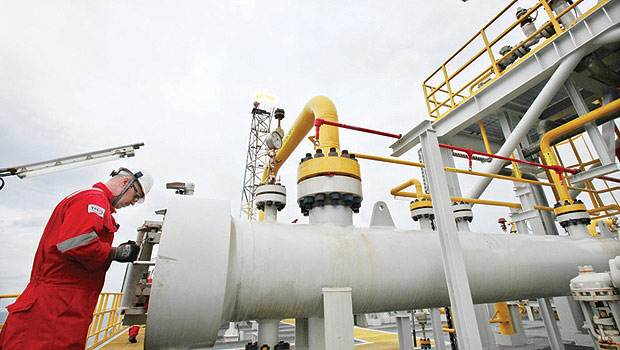Petrobras invested 72.5 billion reais ($42.05 billion), a 5.1 percent drop from 76.4 billion reais in 2010, executives said.
The Rio de Janeiro-based company's preferred shares tumbled 7.8 percent on Friday, on track for their biggest daily drop since August, a day after Petrobras said fourth-quarter profit fell 52 percent and also said it had signed a massive order for high-tech oil drilling ships.
Incoming Chief Executive Maria das GraÁas Foster must turn around the company if Petrobras is to achieve its goal of nearly tripling output to 6.4 million barrels a day in 2020, enabling Brazil to challenge the United States as the world's No. 3 oil producer.
The plan centers on "the subsalt", an area the size of the US state of New York off the coast of Rio de Janeiro which could hold 100 billion barrels of oil, enough to meet all US needs for more than 14 years. Estimates of the cost of building the ships, rigs, wells and equipment to tap the offshore reserves start at more than half a trillion dollars.
"The challenges we face are structural," said JosÈ SÈrgio Gabrielli, who will step down on Monday after more than six years as CEO. "We are definitely in a moment of transition."
That transition involves turning 150 billion reais of unfinished investments into productive projects, said Almir Barbassa, chief financial officer.
"This is a terrible result," said Lucas Brendler, oil and gas analyst with Geracao Futuro a Porto Alegre, Brazil-based asset manager that owns Petrobras stock. "But there is still the outlook of strong production upswings in 2013."
Petrobras' expansion has been held up by world-wide shortages of everything from giant steel spheres for refineries to jet turbines needed to power oil platforms, said Renato Duque, Petrobras' head of supply services.
"It's not just in Brazil, it's international," he said at a news conference at company headquarters in Rio de Janeiro.
"There are shortages of everything."
PRESSURED TO GROW
If increasing project delays, technical hurdles and a growing shortage of qualified workers were not enough, state-owned Petrobras faces rising pressure from its controlling shareholder. Brazil's government is eager to convert the offshore oil into economic growth.
Instead of scaling back, Petrobras is committing to more spending on giant, technically challenging projects. New laws aimed at increasing Brazilian control over oil production will make Petrobras the sole operator in all new concessions leased in the subsalt area, known as such because of a think oil-trapping layer of salt that runs under the region.
Subsalt region production already accounts for more than 80 percent of Brazil's oil output, due to older oil discoveries above the salt layer. Output is dominated by Petrobras and includes a small, but growing contribution from companies such as Royal Dutch Shell, Chevron and BP.
Petrobras agreed on Thursday to pay a whopping $76.3 billion over 15 years to lease 26 deepwater oil drilling rigs from Brazilian company Sete Brasil and Cyprus's Ocean Rig.
Each of the rigs costs $750 million to $1 billion to build.
The vessels must be built in Brazilian shipyards due to new rules requiring Brazilian companies make up much of the supply chain for the country's burgeoning oil industry.
Gabrielli said Brazil is unlikely at present to have enough shipyards to build the vessels. Getting the new rigs, then, could take longer than expected. Adding to the sheer size of the fields it hopes to develop, Petrobras has found giant new resources outside the subsalt in a prospect called Barra, off the coast of Brazil's Sergipe state.
"This will change the face of Northeast Brazil and the oil market in Brazil," said Guilherme Estrella, Petrobras' outgoing director of exploration and production on Friday. "I won't give an estimate, but it's a very important discovery."
VERY BAD RESULTS
On Thursday, the company reported fourth-quarter net income of 5.05 billion reais, down sharply from 10.60 billion reais a year earlier and far below the 9.20 billion real average estimate of 10 analysts surveyed by Reuters. It was also lower than Petrobras' third-quarter profit of 6.33 billion reais.
The figures "were below our expectations particularly spending on imports were much bigger," said Paula Kovarsky and Diego Mendes, oil and gas analysts at Ita? BBA in a note to investors calling the results "very bad."
More than 600 million reais of the profit decline came from "impairment" after the company reduced its long term oil price outlook to about $60 a barrel from about $80, causing the potential revenue from older, more expensive and less productive fields to fall, said Barbassa, the chief financial officer.
Lower oil prices could also reduce future cash flow to finance investment. Petrobras has financed much of its new spending with debt despite a $70 billion stock sale in 2010, the largest ever stock offer. Net debt rose 50 percent to 54.9 billion reais in 2011 compared with 36.6 billion reais in 2010.
Profits were also crimped in 2011 by surging demand for gasoline which reached a record 70,000 barrels a day in December. Soaring vehicle sales and transportation growth in Brazil are straining the company's domestic refining capacity.
"It's impossible to foresee in normal circumstances that the consumption of fuels would grow at three times the rate of (gross domestic product)," Gabrielli said.
Gasoline, cooking gas, diesel and naphtha production is at its limit and the problem won't be resolved until 2013, when the first of five new refineries under construction begin output.
Despite huge investments, Petrobras' global output of 2.72 million barrels a day was lower in December than a year earlier.
Estrella, said domestic oil output could have been 40,000 barrels per day higher but for unplanned platform outages. The company produces just over 2 million barrels of oil a day in Brazil. — Reuters










